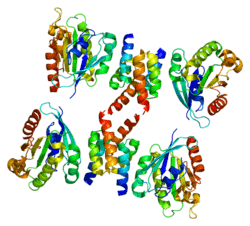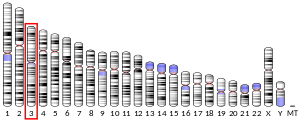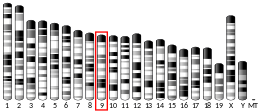GOLGA4
Golgin subfamily A member 4 is a protein that in humans is encoded by the GOLGA4 gene.[5][6]
The Golgi apparatus, which participates in glycosylation and transport of proteins and lipids in the secretory pathway, consists of a series of stacked cisternae (flattened membrane sacs). Interactions between the Golgi and microtubules are thought to be important for the reorganization of the Golgi after it fragments during mitosis. The golgins are a family of proteins, of which the protein encoded by this gene is a member, that are localized to the Golgi. This protein has been postulated to play a role in Rab6-regulated membrane-tethering events in the Golgi apparatus. Alternative splice variants have been described but their full-length nature has not been determined.[6]
Interactions
GOLGA4 has been shown to interact with ARL1.[7][8]
References
- GRCh38: Ensembl release 89: ENSG00000144674 - Ensembl, May 2017
- GRCm38: Ensembl release 89: ENSMUSG00000038708 - Ensembl, May 2017
- "Human PubMed Reference:". National Center for Biotechnology Information, U.S. National Library of Medicine.
- "Mouse PubMed Reference:". National Center for Biotechnology Information, U.S. National Library of Medicine.
- Erlich R, Gleeson PA, Campbell P, Dietzsch E, Toh BH (June 1996). "Molecular characterization of trans-Golgi p230. A human peripheral membrane protein encoded by a gene on chromosome 6p12-22 contains extensive coiled-coil alpha-helical domains and a granin motif". J Biol Chem. 271 (14): 8328–8337. doi:10.1074/jbc.271.14.8328. PMID 8626529.
- "Entrez Gene: GOLGA4 golgi autoantigen, golgin subfamily a, 4".
- Lu, Lei; Hong Wanjin (September 2003). "Interaction of Arl1-GTP with GRIP Domains Recruits Autoantigens Golgin-97 and Golgin-245/p230 onto the Golgi". Mol. Biol. Cell. 14 (9): 3767–3781. doi:10.1091/mbc.E03-01-0864. ISSN 1059-1524. PMC 196566. PMID 12972563.
- Van Valkenburgh, H; Shern J F; Sharer J D; Zhu X; Kahn R A (June 2001). "ADP-ribosylation factors (ARFs) and ARF-like 1 (ARL1) have both specific and shared effectors: characterizing ARL1-binding proteins". J. Biol. Chem. 276 (25): 22826–22837. doi:10.1074/jbc.M102359200. ISSN 0021-9258. PMID 11303027.
Further reading
- Kooy J, Toh BH, Pettitt JM, et al. (1992). "Human autoantibodies as reagents to conserved Golgi components. Characterization of a peripheral, 230-kDa compartment-specific Golgi protein". J. Biol. Chem. 267 (28): 20255–20263. PMID 1400343.
- Fritzler MJ, Lung CC, Hamel JC, et al. (1996). "Molecular characterization of Golgin-245, a novel Golgi complex protein containing a granin signature". J. Biol. Chem. 270 (52): 31262–31268. doi:10.1074/jbc.270.52.31262. PMID 8537393.
- Gleeson PA, Anderson TJ, Stow JL, et al. (1997). "p230 is associated with vesicles budding from the trans-Golgi network". J. Cell Sci. 109 (12): 2811–2821. PMID 9013329.
- Barr FA (1999). "A novel Rab6-interacting domain defines a family of Golgi-targeted coiled-coil proteins". Curr. Biol. 9 (7): 381–384. doi:10.1016/S0960-9822(99)80167-5. PMID 10209123.
- Daigo Y, Isomura M, Nishiwaki T, et al. (1999). "Characterization of a 1200-kb genomic segment of chromosome 3p22-p21.3". DNA Res. 6 (1): 37–44. doi:10.1093/dnares/6.1.37. PMID 10231028.
- Eichmuller S, Usener D, Dummer R, et al. (2001). "Serological detection of cutaneous T-cell lymphoma-associated antigens". Proc. Natl. Acad. Sci. U.S.A. 98 (2): 629–634. doi:10.1073/pnas.021386498. PMC 14639. PMID 11149944.
- Van Valkenburgh H, Shern JF, Sharer JD, et al. (2001). "ADP-ribosylation factors (ARFs) and ARF-like 1 (ARL1) have both specific and shared effectors: characterizing ARL1-binding proteins". J. Biol. Chem. 276 (25): 22826–22837. doi:10.1074/jbc.M102359200. PMID 11303027.
- Strausberg RL, Feingold EA, Grouse LH, et al. (2003). "Generation and initial analysis of more than 15,000 full-length human and mouse cDNA sequences". Proc. Natl. Acad. Sci. U.S.A. 99 (26): 16899–16903. Bibcode:2002PNAS...9916899M. doi:10.1073/pnas.242603899. PMC 139241. PMID 12477932.
- Lu L, Hong W (2004). "Interaction of Arl1-GTP with GRIP Domains Recruits Autoantigens Golgin-97 and Golgin-245/p230 onto the Golgi". Mol. Biol. Cell. 14 (9): 3767–3781. doi:10.1091/mbc.E03-01-0864. PMC 196566. PMID 12972563.
- Ota T, Suzuki Y, Nishikawa T, et al. (2004). "Complete sequencing and characterization of 21,243 full-length human cDNAs". Nat. Genet. 36 (1): 40–45. doi:10.1038/ng1285. PMID 14702039.
- Anderson NL, Polanski M, Pieper R, et al. (2004). "The human plasma proteome: a nonredundant list developed by combination of four separate sources". Mol. Cell. Proteomics. 3 (4): 311–326. doi:10.1074/mcp.M300127-MCP200. PMID 14718574.
- Wu M, Lu L, Hong W, Song H (2004). "Structural basis for recruitment of GRIP domain golgin-245 by small GTPase Arl1". Nat. Struct. Mol. Biol. 11 (1): 86–94. doi:10.1038/nsmb714. PMID 14718928.
- Kakinuma T, Ichikawa H, Tsukada Y, et al. (2004). "Interaction between p230 and MACF1 is associated with transport of a glycosyl phosphatidyl inositol-anchored protein from the Golgi to the cell periphery". Exp. Cell Res. 298 (2): 388–398. doi:10.1016/j.yexcr.2004.04.047. PMID 15265687.
- Beausoleil SA, Jedrychowski M, Schwartz D, et al. (2004). "Large-scale characterization of HeLa cell nuclear phosphoproteins". Proc. Natl. Acad. Sci. U.S.A. 101 (33): 12130–12135. Bibcode:2004PNAS..10112130B. doi:10.1073/pnas.0404720101. PMC 514446. PMID 15302935.
- Luke MR, Houghton F, Perugini MA, Gleeson PA (2005). "The trans-Golgi network GRIP-domain proteins form α-helical homodimers". Biochem. J. 388 (Pt 3): 835–841. doi:10.1042/BJ20041810. PMC 1183463. PMID 15654769.
- Yoshino A, Setty SR, Poynton C, et al. (2006). "tGolgin-1 (p230, golgin-245) modulates Shiga-toxin transport to the Golgi and Golgi motility towards the microtubule-organizing centre". J. Cell Sci. 118 (Pt 10): 2279–2293. doi:10.1242/jcs.02358. PMID 15870108.
- Olsen JV, Blagoev B, Gnad F, et al. (2006). "Global, in vivo, and site-specific phosphorylation dynamics in signaling networks". Cell. 127 (3): 635–648. doi:10.1016/j.cell.2006.09.026. PMID 17081983.






